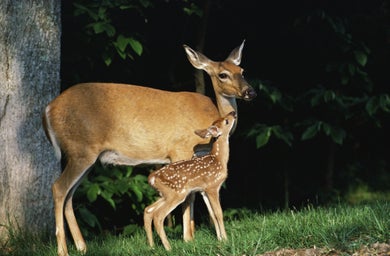As humans continue their spread from city to suburbia to rural areas, deer are increasingly left with less area to roam. At one point in the late 19th century, deer populations dwindled to close to nothing. Heavy commercial hunting took a toll, but over the last several decades, deer have made a comeback. Rampant hunting decreased in popularity because homeowners did not want hunters in their backyard. Now, deer are plentiful and more than happy to feast on your garden.
Deer have such a negative and lasting impact on the health and growth of green space and gardens that without their influence, plants, flowers, crops, and trees prosper. There are many avenues to take to achieve a deer-less garden, the most effective being the installation of deer fences around the perimeter to ensure the migration of deer to other pastures.
• Plant Odiferous Perennials along the Perimeter. Deer rely heavily on their sense of smell to guide them to tasty eats. By planting herbs that exude strong scents like chives, mint, and garlic along the perimeter of your garden or green space, you can mask the milder and more appealing interior scents and encourage them to be on their way.
• Keep a Well Maintained Garden. If you allow grasses to get long and fruits to over ripen on the vine, you’re inviting deer trouble. By keeping grasses low, deer won’t be encouraged to bed in them, and by discarding overripe crops; they won’t have an easy feed.
• Remember that They Scare Easily. Deer are fearful of new and unfamiliar objects. That’s why things like shiny garden ornaments, sundials, and scarecrows can help give them pause before entering your garden. Objects with moveable parts or those that make noise in the wind, will serve well to keep deer out of your yard.
• A Rotation of DIY Repellents. A spray made of hot pepper sauce, rotten egg and garlic in your garden is an effective way to keep deer moving to other green spaces. Other homemade repellents include blood meal, bags of hair, ammonia-soaked rags, hanging strips of fabric softeners, and bars of soap. Keep in mind that these DIY formulas will have to be replaced on regular occasion due to precipitation and general breaking down of the substances.
• String up Fishing Line. Deer aren’t able to comprehend the idea of glass, so clear fishing line, set two or three feet above the ground, will confuse them enough so they won’t enter.
• Wrap up new Plants. A physical barrier between deer and your new plants is sometimes the idea way to protect them. You can use garden nets, plastic tree wrap, and pliable mesh deer fencing to place around bushes, bulbs, and fruit trees.
• Get a Dog. Letting a dog out into the yard will help keep deer scared away. Regardless of the size of the dog, their bark and scent will naturally repel deer. Be sure to let the dog tag along while the children are playing and when you are gardening, so you can be certain the dog’s scent is in your yard. It’s also a good time to teach them the ‘right’ and ‘wrong’ places to dig, if they are so inclined!
• Install Floodlights. Deer don’t like bright lights, so if you install motion (or other) lights for your lawn or garden, deer will be less likely to munch on the fruits of your labor. However, just like with other scare tactics like scarecrow or windblown ribbons, deer will eventually realize and come to understand that the lights (and objects) can’t hurt them and so will be less of a deterrent.
• Build Levels. Deer may be able to jump but they aren’t good at climbing. Building terraces and sunken beds for your garden landscape will discourage them from entering your yard. If you stack pallets around the perimeter of your yard, deer will likely keep moving along because they won’t want to jump or walk on them.
• Plant Thick Hedges. If deer can’t see all of the sumptuous delights you have waiting for them in your garden, they won’t bother with trying to get at them. By planting boxwoods and other thick hedge varieties around your yard, you can visually shield your garden from deer that will be just as happy to keep moving along.
You, too, can achieve a deer-less garden with a little prepping and planning. It is estimated by wildlife scientists that there are around 20 deer per every square mile in the United States, with each adult deer eating 6-10 pounds of greenery each day. The most effective and durable barrier is deer fencing, but if you’re willing to put in the time and effort to maintain them, there are other methods to try.


